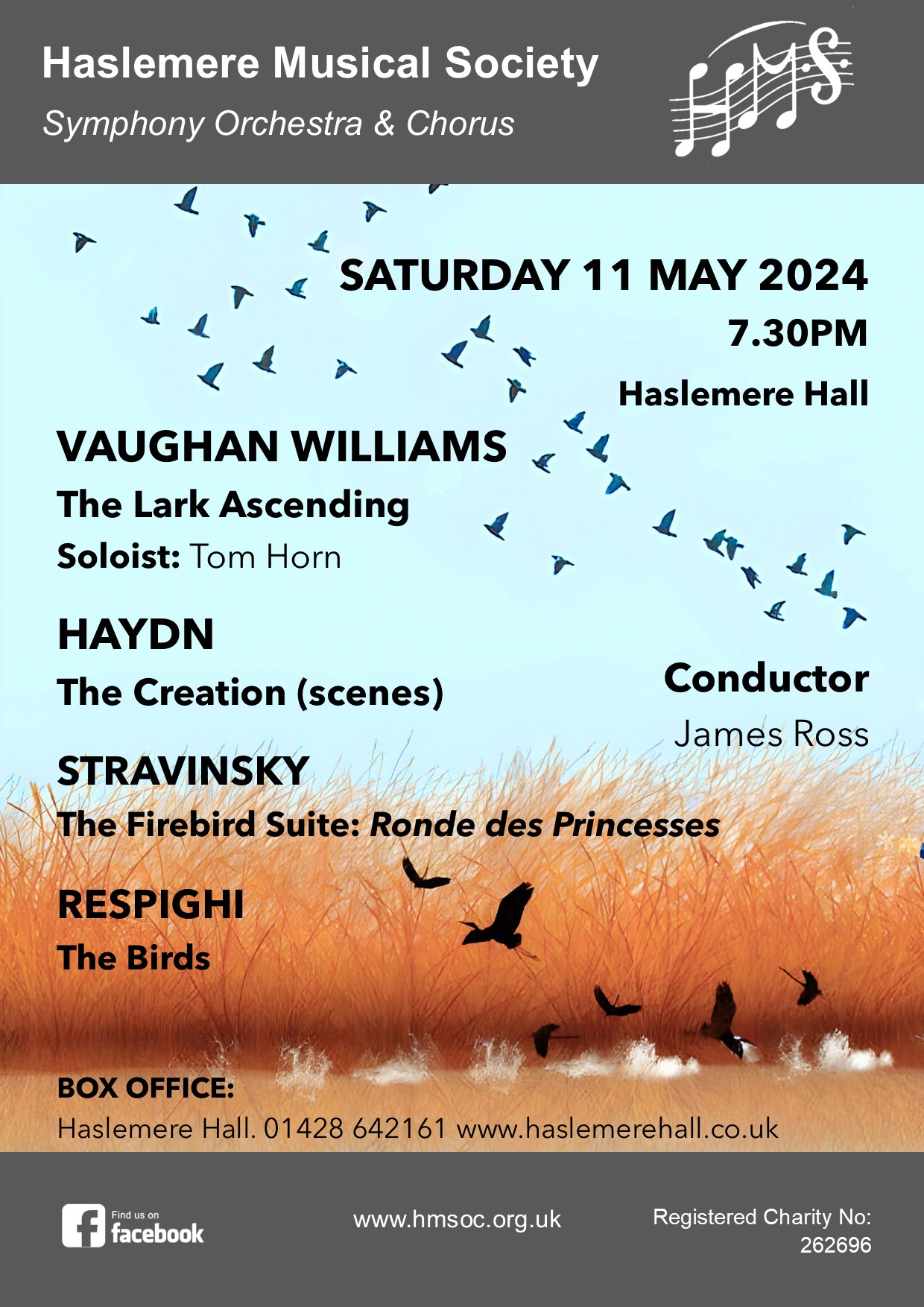May concert - Haslemere Hall
 Saturday 11th May 2024
Saturday 11th May 2024
Throughout the 100 years of its existence, one of the most impressive and enjoyable aspects of Haslemere Musical Society’s regular concerts has been its ability and willingness to showcase the astonishing talent of its own members. A sold-out Haslemere Hall audience bore witness to this yet again on Saturday evening with a scintillating concert of Respighi, Stravinsky, Vaughan Williams and Haydn that shone a spotlight on many of HMS’s musicians throughout a typically well-constructed and thoughtful programme. Effortlessly balancing new listener experiences with familiar classics, conductor James Ross crafted an uplifting blend of music evoking a sense of optimism and reflection; a sentiment that was hard to resist with the evening sun streaming into the Hall.
For this, the final concert of the Society’s centenary season, Ross challenged and rewarded the audience in the first half with a playfully avian theme that began with Respighi’s 1928 suite, ‘The Birds’. The triumphant and stately opening bars set the tone before allowing us glimpses of the gentler, more lyrical subtlety to come. Rhapsodic, interwoven solo melodies in the woodwind, strings and horn were exquisitely delivered with impressive sensitivity and musicianship. The agility necessary to deliver a gentle melody one minute and imitate a nightingale the next was evident throughout and the players handled the changes of texture with skill and intelligence.
The delicate juxtaposition of shimmering, sustained ensemble playing and the mellifluous, mournful melodies of the ‘Ronde des Princesses’ from Stravinsky’s 1919 suite ‘The Firebird’ was electric. Here too, the abilities of HMS’s principal players were allowed to shine through. Slow, controlled and balanced, there were few clues as to the drama that would unfold in later movements.
Vaughan Williams’s 1914 masterpiece, ‘The Lark Ascending’, would feature amongst many people’s Desert Island Discs. Capturing the very essence of freedom and self-expression, the lark must repeatedly break free from – and return to – the orderly and grounded orchestral texture. As if his contribution thus far had not been enough, HMS’s Leader, Tom Horn, rose from his chair and delivered a spine-tingling and virtuosic performance, filled with dexterity and pathos, with the lark finally escaping into a clear blue sky – and sending us into the interval feeling at least an inch taller.
Thoughtfully selected scenes from Haydn’s dramatic 1798 oratorio, ‘The Creation’, filled the second half. Here too, home-grown talent was at the forefront of the performance; returning soprano soloist Clare Loosley is a former HMS violinist and bass soloist Tom Lydon is the current Chorus Master. They joined Guildford-born tenor, Richard Thesiger-Pratt to complete a dextrous and well-blended trio. After the hushed opening, the sudden impact of the word, “Light!”, exploding from the chorus rocked everyone back in their seats. The singers, wearing golden feathers on their lapels, allowed their obvious enjoyment to shine through as they told of the Glory of God with harps and lyres, rising suns and a new world springing up at God’s command. After the tenor’s ominous warning to Adam and Eve, the final chorus, ‘Praise the Lord, ye voices all!” raised the roof with the orchestra, chorus and soloists taking us to the close with energy, commitment and passion.
It was another wonderful evening’s entertainment from a society justly proud of its history. We can only hope that recent cuts to grant funding will not damage its ability to thrill and inspire the community for at least another 100 years to come.
William Unwin
11/05/2024


